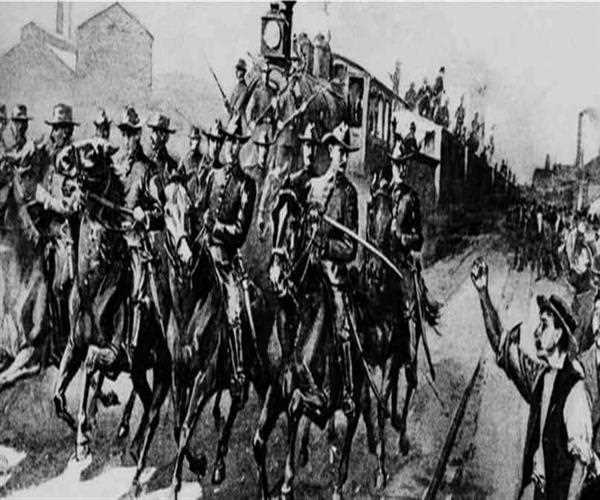*The Pullman Strike*

In light of budgetary switches identified with the monetary melancholy that started in 1893, the Pullman Palace Car Company, a maker of railroad autos, cut the effectively low wages of its laborers by around 25 percent however did not present relating decreases in rents and different charges at Pullman, its organization town close Chicago, where most Pullman specialists lived. Subsequently, numerous specialists and their families confronted starvation. At the point when an appointment of specialists attempted to display their grievances about low wages, poor living conditions, and 16-hour workdays straightforwardly to the organization's leader, George M. Pullman, he declined to meet with them and requested them terminated. The appointment at that point voted to strike, and Pullman laborers strolled off the activity on May 11, 1894. When the plant had purged, organization delegates posted signs at all the entryways: "The works are shut until the point when additionally take note."
At the season of the strike, 35 percent of Pullman's workforce was spoken to by the American Railway Union (ARU), which had driven a fruitful strike against the Great Northern Railway Company the prior year. In spite of the fact that the ARU was not actually associated with the Pullman laborers' choice to strike, association authorities had been in Pullman and at the gathering at which the strike vote was taken, and Pullman specialists without a doubt trusted that the ARU would back them. At the point when the ARU assembled in Chicago in June for its first yearly tradition, the Pullman strike was an issue on the agents' brains.
A lot of sensitivity existed in Chicago and somewhere else for the Pullman laborers, who were viewed as regular people tyrannized by an oppressive boss and proprietor. The inquiry was the way the ARU could bolster the laborers, who, all things considered, did not precisely deal with the railways. One arrangement was to decline to hitch Pullman autos to trains and to unfasten those that were at that point joined. Another thought was a blacklist: ARU individuals would decline to deal with Pullman autos or any trains with Pullman autos until the point that the railways disjoined their ties with the Pullman Company.
On June 22 the ARU delegates passed a movement to start a boycott unless the Pullman Company consented to present the question to discretion by June 26. Amid the following three days, a few panels were sent to the organization in the expectation of winning concessions that would make the blacklist superfluous, however, all were dismissed.
Critical to the achievement of any blacklist would be the switchmen, who had joined the ARU in substantial numbers. The ARU's leader, Eugene V. Debs, anticipated that, once the switchmen declined to include or expel Pullman autos from trains, the railways would terminate them and attempt to supplant them with nonunion specialists, and that thusly would lead other association individuals to exit in solidarity, along these lines conveying an ever-increasing number of trains to an end.
The situation played out as Debs had anticipated. On June 27, 5,000 laborers left their occupations and 15 railways were tied up. By the following day, 40,000 had strolled off, and rail movement was growled on all lines west of Chicago. On the third day, the number of strikers had moved to 100,000, and no less than 20 lines were either tied up or totally ceased. By June 30, 125,000 specialists on 29 railways had stopped work instead of handling Pullman autos. The ARU had a couple of local people in the East or the Deep South, however, the blacklist appeared to be astoundingly successful wherever else.
Debs may have been satisfied by the viability of the blacklist, however, he was likewise frightened by the outrage communicated by the laborers, which he dreaded could prompt brutality. Amid the main seven day stretch of the blacklist he sent somewhere in the range of 4,000 wires, hundreds consistently, encouraging the ARU local people to remain quiet and not to go overboard.
On June 29 Debs talked at a huge and serene assembling in Blue Island, Illinois, to accumulate bolster from kindred railroad specialists. After he cleared out, in any case, bunches inside the group ended up chafed, set fire to close-by structures, and crashed a train. Sadly for the strikers, the train was connected to a U.S. mail prepare. That extraordinarily irritated President Grover Cleveland in that the strike had now kept the government from practicing one of its most-vital duties.
Cheers!